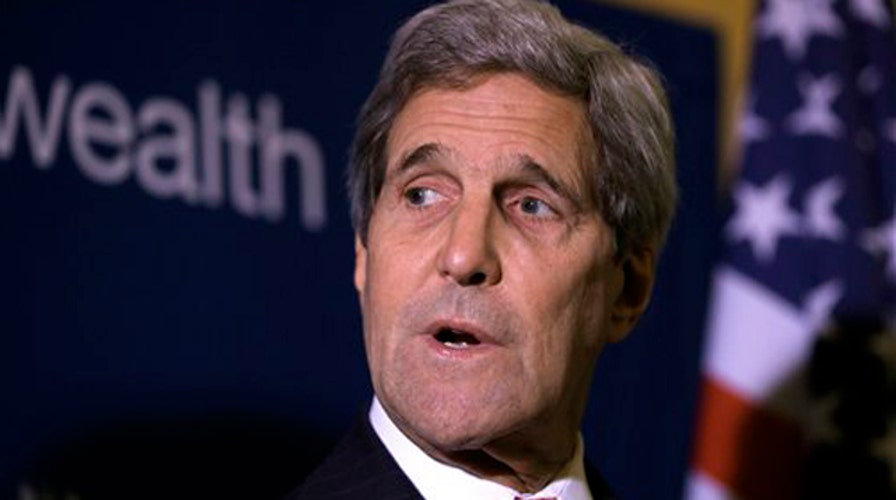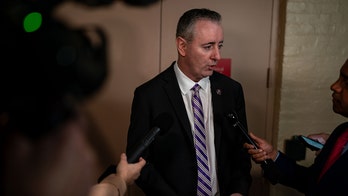European leaders scrambled Thursday to try and forge a diplomatic deal to end fighting in eastern Ukraine, in an apparent bid to head off U.S. consideration of lethal military aid for the Ukrainian government in its war against Russian-backed separatists.
At the same time, a bipartisan call in Congress for the U.S. to arm Ukraine was only growing, with lawmakers saying the military aid "is past due."
"We can't just stand by and let them be slaughtered by superior weapons," Sen. John McCain, R-Ariz., chairman of the Senate Armed Services Committee, said Thursday.
Top Obama officials are weighing pleas from both sides, without tipping their hand as to the next step as they hold a flurry of meetings with European counterparts.
Secretary of State John Kerry, who met with top Ukrainian officials in Kiev on Thursday, offered no definitive decision on the question of lethal aid. But he said President Obama is reviewing all options, including "the possibility of providing defensive systems to Ukraine."
"We are not interested in a proxy war. Our objective is to change Russia's behavior," Kerry said.
A "proxy war," fueled by an influx of U.S. weapons, presumably is the fear of the leaders of France and Germany, who headed to Kiev and Moscow to seek a possible deal. Asked about those concerns at Thursday's White House press briefing, Obama's top spokesman Josh Earnest said the president takes the views of U.S. allies very seriously and will consult with them, though he will make whatever decision he believes is in the best interest of the U.S.
On Capitol Hill, however, lawmakers on both sides of the aisle had a clear message Thursday for the president: arm Ukraine.
"It is time to give Ukraine the ability to defend itself," Sen. Kelly Ayotte, R-N.H., said. "It is past due."
Sen. Jack Reed, D-R.I., top Democrat on the armed services committee, said the "key here is to give the Ukrainians the ability to defend itself and to get back to a political solution."
Sen. Bill Nelson, D-Fla., said the non-lethal aid the U.S. already is sending "is not enough when you are facing the Russian bear."
The developments come as resurgent fighting in eastern Ukraine is threatening Europe's overall security.
Fighting between Russia-backed separatists and Ukrainian forces in eastern Ukraine surged in January, sending the death toll to over 5,300 people killed since the conflict began in April. At least three people were killed in overnight shelling in the rebel stronghold of Donetsk, local officials said, and a Ukrainian military spokesman reported five servicemen killed and 29 others wounded in the last 24 hours.
Russia has vehemently denied backing the rebels with troops and weapons, while acknowledging that some Russians are fighting with the separatists. Western military experts scoff at the Russian denial. The top NATO commander, U.S. Air Force Gen. Philip Breedlove, said Thursday that Russia continues to supply the separatists with heavy, state-of-the-art weapons, air defenses and fighters.
In Kiev, Kerry said, "Russia and the separatists are seizing more territory, terrorizing more citizens, and refusing to participate in serious negotiations." Kerry urged Russia to show its commitment to a peaceful, diplomatic solution to the conflict in eastern Ukraine by ceasing its military support for the separatists and bringing them to the negotiation table.
France and Germany, though, were hoping this time they can come up with a peace deal that both Ukraine and Russia can agree upon. French President Francois Hollande and German Chancellor Angela Merkel traveled to Kiev and met with Ukraine President Petro Poroshenko on Thursday evening. They plan to visit Moscow on Friday with a peace proposal "based on the territorial integrity of Ukraine."
"It will not be said that France and Germany together have not tried everything, undertaken everything, to preserve the peace," Hollande said earlier. A senior French government official said the two leaders decided Wednesday night on the trip and did not consult American officials about it.
In Moscow, Putin adviser Yuri Ushakov said Russia was "ready for a constructive conversation" aimed at stabilizing the situation, establishing a dialogue between the Ukrainian government and the rebels and rebuilding economic ties between eastern Ukraine and Kiev.
Western diplomats said Putin gave the French and Germans a nine-page peace plan, and that Hollande and Merkel were taking a repackaged version of that with them. The diplomats said the European version drops the most objectionable elements of the Russian plan to fit what Ukraine and the Europeans want, such as some autonomy for eastern Ukraine with special protections for language, culture and local taxes.
Kerry, meanwhile, brought $16.4 million in new humanitarian aid to Ukraine.
The Associated Press contributed to this report.





